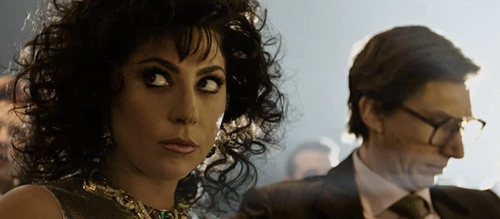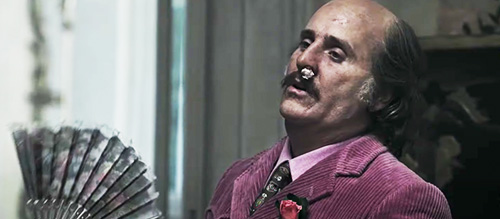House of Gucci (2021) Review

House of Gucci (2021)
Director: Ridley Scott
Screenwriters: Becky Johnston, Roberto Bentivegna
Starring: Lady Gaga, Adam Driver, Jared Leto, Al Pacino, Jeremy Irons, Salma Hayek, Jack Huston, Reeve Carney, Camille Cottin, Vincent Riotta, Youssef Kerkour
Ridley Scott’s second film of 2021 is based on Sara Gay Forden’s “The House of Gucci: A Sensational Story of Murder, Madness, Glamour, and Greed”, and with such a lurid title you would expect the film adaptation to be entertaining at the very least. House of Gucci is that, but only intermittently, and half the time you’re not sure if the entertainment value is intentional or not.
Based on the scandalous true story of the troubled Gucci fashion dynasty over two decades from the late 70s, House of Gucci tells of ambitious lover of fine things Patrizia Reggiani (Lady Gaga) falling for Gucci heir apparent Maurizio (Adam Driver) and marrying into his lavish family. Domestic bliss and a life of luxury does not last and so Patrizia begins to engineer the couple’s takeover of the family fashion line in order to fund the most extravagant of lifestyles, looking to oust the more established Gucci family members in the process. There will be back-stabbing, the most privileged of family bust-ups, and there will be blood.
First, the good…
Being a Ridley Scott film, much care and attention has been lavished on its aesthetic strengths, with DP Dariusz Wolski (The Last Duel) bringing some striking cinematography to bear, and Janty Yates’ (All the Money in the World) costume design helping to tell a story all its own in this period of massive excess.
There’s also very little wrong with the first act of the film, which follows Patrizia and Maurizio’s unlikely meet-cute and the passionate early stages of their relationship – it’s funny and compelling and belongs in a better film. She meets him at a club, mistakes him for a cute and awkward bartender, he makes her a passable martini before revealing himself as one of those Guccis who make such stylish handbags and loafers, and before we know it she’s strong-arming him into a marriage proposal.
Following Patrizia and Maurizio’s wedding we start meeting more members of the Gucci dynasty. It is here that the film becomes much less sure-footed, losing sight of what the central story is trying to say about anyone’s real motivations for doing what they are doing and struggling to give all the key players enough to do.
Any scene fronted by Lady Gaga, Adam Driver or both works like gangbusters; their chemistry and hugely contrasting personalities draw you in, and they both look to be having a lot of fun playing it a bit more over-the-top than usual. Gaga has Italian heritage herself so has clearly made peace with the cultural stereotypes embodied in her formidable character and the surrounding film, but as her performance is the lively storm that blows away the cobwebs and grey tedium found elsewhere, you can hardly object to her projecting to the back seats.
Unfortunately, others in the cast seem to have wandered in from another film entirely and do nothing to keep you engaged. Jeremy Irons looks bored in his limited screen time as the ailing, snobbish Gucci patriarch Rodolpho, and Al Pacino is on autopilot playing his showman brother Aldo, speaking very softly until he inevitably booms something to make a point. And then there’s Jared Leto…

There’s no two ways about it, Jared Leto as Aldo’s hack son Paolo is the worst thing in this film, killing dead any scene he’s in (and he’s in it quite a bit) by instantly throwing off the rhythm or diffusing any tension built up with his astoundingly misjudged grab-bag of physical tics and phonetic Italian accented verbiage. It’s a shame that his scenes work to do nothing more than drag the surrounding film down with them because they’re also the funniest and most diverting moments in the film, strangely captivating in all the wrong ways like a snake eating something twice the size of itself.
Roger Ebert once said “No good movie is too long and no bad movie is short enough”. There’s very little reason for House of Gucci to be two-and-a-half hours long. The relative lack of memorable incident and clear connective tissue between its episodic chapters definitely invites comparison with TV soap operas, but somebody forgot to tell half of the cast that this was the tone they were supposed to be aiming for. You’re also left to guess how much time is supposed to have passed almost entirely by what attention-grabbing hairstyle Patrizia is currently rocking, the Gucci family’s story feeling strangely disconnected from the real world’s progression around it.
The film eventually comes to the conclusion that Gucci as a business works much better when there are no Guccis involved, and it’s hard to argue the point. As they were squabbling and plotting against each other, sabotaging and making power plays, the business was tanking and it only reached its true potential as a profitable venture when Tom Ford and other talented designers became involved, the company given over to people who knew their way around accounting.
Sadly House of Gucci was never going to be as compelling a story about warring families as ‘Succession’ or ‘Game of Thrones’, nor is it a particularly engaging crime epic like Scott’s own American Gangster. Film fans will be frustrated by the shortfalls in the basic storytelling and fashion experts will learn nothing about Gucci they didn’t already know. Despite Gaga and Driver’s best efforts, and some of the more bizarre plot turns being absolutely true to life, this is merely an underwhelming tale of petty, rich bitches.
13/24
Recommended for you: Ridley Scott Films Ranked

